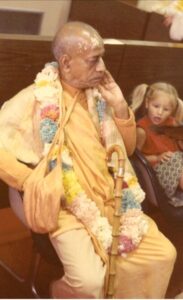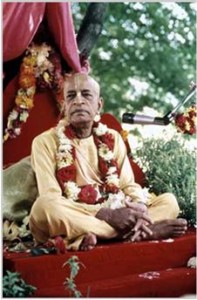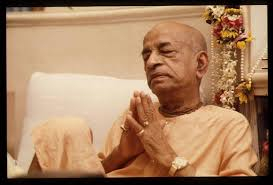
So we have to learn how to chant. Therefore in the śāstras, in thePurāṇas, the ten kinds of offenses are described. And Śrīla Jīva Gosvāmī has given very much stress to avoid these offenses. Śuddha-nāma. In the beginning we cannot chant pure form of the (holy) name, because we are accustomed… But still, by chanting process, then it becomesnāmābhāsa, almost pure. Ābhāsa means just like before sunrise, you find the darkness is off, but it is not sunlight. It is different from sunlight, but still, there is the dawn, you can see everything distinctly. Similarly, first there is offensive name and, if you avoid, avoid the ten kinds of offenses, then gradually it becomes nāmābhāsa. And ŚrīlaHaridāsa Ṭhākura has
said, Namācārya, thatby nāmābhāsa, one becomes liberated. There was some argument with Haridāsa Ṭhākura and one brāhmaṇa in the office of Raghunātha dāsa Gosvāmī’s father, uncle. So there were some high level talks on this nāmābhāsa. So bynāmābhāsa one becomes liberated.By chanting Hare Kṛṣṇa mantra offensive, one becomes materially happy or distressed, but when one comes to the stage of nāmābhāsa, he becomes liberated. And when he chants pure name, there is Kṛṣṇa–prema. Just like Rūpa Gosvāmī: he was chanting. We are also chanting. But we are not in the stage of RūpaGosvāmī or Sanātana Gosvāmī and Haridāsa Ṭhākura. Actually, if wecome to that stage then there will be Kṛṣṇa–prema, love of Kṛṣṇa. Just like Rūpa Gosvāmī said that “What shall I chant with one tongue and two ears? If there were millions of tongues and trillions of ears, I could chant something.” And we cannot finish even sixteen rounds, because we have not created our taste for chanting. Still we are in thenāmāparādha stage. But don’t be disappointed. Go on chanting. You’ll come to the right position, nāmābhāsa, then śuddha–nāma. Everything requires gradual development.












